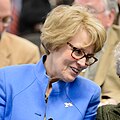| President of the University of Michigan | |
|---|---|
| University of Michigan | |
| Reports to | Board of Regents |
| Residence | President's House |
| Appointer | Board of Regents |
| Constituting instrument | Constitution of Michigan |
| Formation | 1850 |
| First holder | Henry Philip Tappan |
| Salary | $1,014,000 [1] |
| Website | president |
The president of the University of Michigan is a constitutional officer who serves as the principal executive officer of the University of Michigan. The president is chosen by the Board of Regents of the University of Michigan, as provided for in the Constitution of the State of Michigan. Fifteen people—fourteen men and one woman—have held the office, in addition to several others who have held it in either an acting or interim capacity.
Contents
The University of Michigan's current interim president is Domenico Grasso, former chancellor of the Dearborn campus. Grasso was appointed by the Board of Regents on May 8, 2025. [2]





















